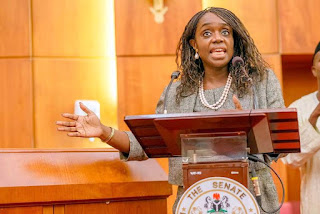She expressed the federal government’s resolve to bridge the gap between recurrent and capital expenditure with a view to freeing the much-needed funds for investment in infrastructure.
Speaking in Abuja yesterday while inaugurating the Efficiency Unit (E-UNIT) in her office, Adeosun said no amount of fiscal innovation, financial re-engineering or other well intention-ed economic policies would deliver the desired results as long as the manner in which government money is expended is not carefully controlled.
According to her, “We need to put the fiscal house in order. Much has been said about the devastating effects of corruption in our economy but little has been said about the costly and incrementally damaging effects of inefficiency and wastage.
“Inefficient spending is systematic and very hard to identify since it is often embedded in the day to day activities of government.
“We are determined to change the balance between capital and recurrent expenditure to release funds for investment in infrastructure that we need. To do so, we must be more efficient in how we spend,” she said.The minister said she was extremely excited inaugurating the nation’s first Efficiency Unit as a critical tool in the management of public expenditure.
“We have seen similar initiatives deliver significant savings globally and I am sure that Nigeria will be no exception. The people have charged us with bringing change and this is an important part of it.
“Our vision is that our Efficiency Unit will be a change agent and catalyst for improving the management and delivery of public services so that we make sure that every naira we spend counts.
“Applying insight and ideas from the private sector and pools of vast practice within the public sector, we aim to provide practical, implementable recommendations that will deliver quantifiable savings to the Nigerian people,” Adeosun said.She observed that in the context of fiscal consolidation, with the low oil price, public services can only be enhanced by reallocating resources from lower priorities to strategic initiatives by generating greater spending efficiency.
The minister pointed out that the primary objective of the E-UNIT initiative is to assist the government in identifying opportunities to reduce wasteful and inefficient spending “by doing more with less.”
Adeosun noted that the scope of the Efficiency Unit would be a wide one, encompassing every Ministry Department and Agency that is in the receipt of public funds.
“Spending public money is a trust and there must be both discipline and accountability in its use.
“We will seek to understand why in many cases the price paid for basic services by government exceseds that is paid in the private sector. The federal government has significant buying power in the market and this must result in keen pricing of all goods and services.
“In deed, in most jurisdictions, providing service to government is often minimally profitable but we have found in Nigeria, the reverse is the case.
“There are a number of factors that may explain this: It may be a function of poor negotiation skills or lack of reliable data.
“Also, the manner in which government operates may be inflating costs; for example, delayed payment or perceived risk of non-payment may result in higher pricing to government procurements” she stated.According to her, initial reviews had unveiled wide variations in the prices of basic items between departments, adding that paper costs varied by up to 80 per cent between departments while range of prices for airline flights to the same destination differed by 100 per cent.
The current economic situation and reduction in oil prices, she noted, had exposed Nigeria’s vulnerabilities and created the need for greater efficiency in government spending.
On whether the recommendations of members of the E-UNIT would be implemented, she said the initiative would not be an ad hoc measure but a permanent, high profile one that would ensure probity in the use of public funds.
She also disclosed that guidelines would be introduced to guide spending while benchmarks will be put in place.
Responding to a question on whether poor remuneration is not an incentive for stealing, the minister said “ stealing is stealing” and cannot bet be rationalised on the altar of poor remuneration.
The E-UNIT is headed by Ms. Patience Oniha, a highly experienced Banker and Chartered Accountant. She had worked with Ecobank Nigeria, Standard Chartered Bank, KPMG and is currently a Director in the Debt Management Office (DMO).
The E-UNIT is headed by Ms. Patience Oniha, a highly experienced Banker and Chartered Accountant. She had worked with Ecobank Nigeria, Standard Chartered Bank, KPMG and is currently a Director in the Debt Management Office (DMO).
Other members of the Committee include Head of Service of the Federation, Accountant-General of the Federation, Auditor-General of the Federation and Director, Budget Office of the Federation.
Drawn from the private sector are Alhaji Kabir Mohammed, former ICAN President; Mr. Kunle Elebute, (Partner KPMG) and Ms. Seyi Kumapayi, Chief Financial Officer, Access Bank.
Members of the supervising committee have agreed to donate their time without fee as their contribution to making government more efficient.
Credit: ThisDay
Credit: ThisDay

No comments:
Post a Comment